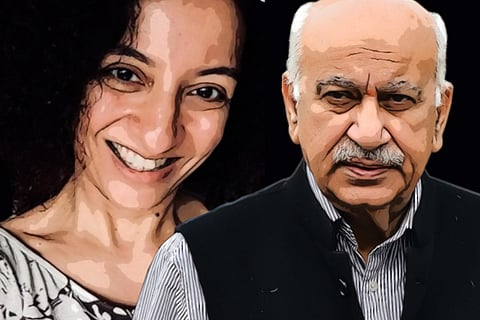

It was a watershed moment for India’s Me Too movement on February 17, 2021, when a Delhi court acquitted journalist Priya Ramani in a defamation case filed against her by former minister MJ Akbar, whom she had accused of sexual harassment and misconduct in 2018. Akbar was named by around 20 women in their Me Too accounts when the movement took Indian media circles by storm. However, Akbar denied all allegations, and slapped a criminal defamation case against Priya, who has maintained that she “spoke the truth in public interest and public faith.”
As her truth emerged victorious on Wednesday, there were several observations made by the court that validated the premise of the Me Too movement further. Additional Chief Metropolitan Magistrate (ACMM) Ravindra Pandey at Delhi’s Rouse Avenue Court observed that “a woman has right to put her grievance even after decades.” The judge added that it was time for the society to “understand that sometimes a victim may for years not speak up due to the mental trauma. The woman cannot be punished for raising her voice against sexual abuse.”
One line of questioning used to silence the survivors who spoke up during the Me Too movements was why they did not speak up when the incident of sexual violence happened. The naysayers argued that survivors spoke up during Me Too for attention, and for harming the reputation of good men. To that effect too, the court today said, “The right of reputation cannot be protected at the cost of right to dignity.” It added, “Sexual abuse takes away dignity and self-confidence,” and that “even a man of social status can be a sexual harasser.” The court also acknowledged systemic sexual harassment at the workplace, and the role the stigma of the same plays in silencing survivors, especially at a time when the Vishakha guidelines were not in place. The Vishakha guidelines served as the basis for the Sexual Harassment of Women at Workplace (Prevention, Prohibition and Redressal) Act of 2013.
Apart from the shame, victim blaming and guilt survivors are made to feel, the society and law put the onus on proof on survivors, making it extremely difficult to speak up. Chinmaya Sripaada, another woman who spoke up during Me Too two years ago and accused lyricist Vairamuthu of sexual harassment, reiterated the same. Reacting to the Priya Ramani judgment, Chinmayi tweeted, “It is our right to identify and expose our molesters. File a case when we have the strength and support to do so.”
Chinmayi was subjected to a lot of vilification and abuse on social media as well as in Tamil media when she spoke up. She, and other survivors were asked invasive and hostile questions, that lacked all sensitivity at one particularly traumatising press conference. This sort of scrutiny is not easy for one to go through, let alone a survivor of sexual violence, and especially if they lack adequate institutional, financial and emotional support.
Further, several women such as filmmaker Leena Manimekalai who accused director Susi Ganesan, writer Vinta Nanda who accused Bollywood actor Alok Nath of rape have revealed they faced loss of work, relationships and alienation after they spoke up in Me Too. Leena is also facing a defamation case from Susi, who has also tried to get her passport impounded, preventing her from going abroad to study for a masters course she is pursuing. A survivor may not necessarily be in a position to deal with such fallouts which prevents them from reporting an incident at that point of time.
And let us not forget that due process, while important, can also be extremely retraumatising and exhausting. Priya deserves praise for seeing this battle through and becoming a beacon for survivors of sexual violence. She indicated in an interview from 2019 that going down the legal route was a lonely path. Writing for Scroll.in, the Bengaluru-based journalist said, “I have no idea if I’m okay. I don’t spend any time thinking about this question. I haven’t really checked what’s going on within me. […] I find it easier to go from court date to court date – 24 in the last one year in case you’re interested, and from here I fly straight to Delhi for my 25th court date.”
While one can argue that it was all worth it now, several people have also pointed out in the aftermath of verdict that we are celebrating is the bare minimum – a survivor not going to jail, a woman not being punished for speaking up.
After she emerged from the court with her lawyer, Rebecca John, all smiles and bright eyed, Priya too acknowledged this. She said that the victory “felt amazing” and she feels “vindicated on behalf of all the women who have ever spoken up against sexual harassment.” Thanking the court for acknowledging sexual harassment at the workplace, she said, “despite the fact that it was me, the victim, that had to stand up in court as the accused.”
While Priya was put on trial for speaking up, MJ AKbar - a powerful man who was accused of sexual misconduct and harassment by her and several others - has simply lost a case which was arguably an intimidation tactic to silence a woman who challenged the norm of staying quiet. But will he ever be put on trial for his alleged transgressions? The answer speaks for itself.